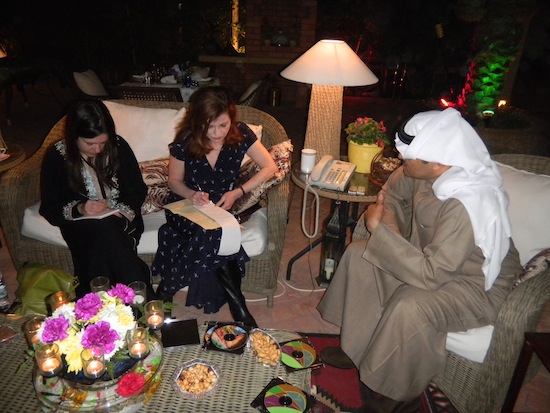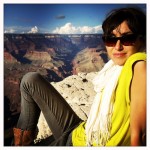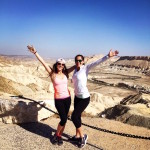Pushing the Limits in Saudi Arabia: In Conversation with Maureen Dowd

During one of Pink Pangea’s travel writing workshops, we reviewed Pulitzer-Prize-winning New York Times columnist Maureen Dowd’s account of her travels as a tourist in Saudi Arabia. In the piece, Ms. Dowd peppers her tourism adventure with her signature tongue-in-cheek irony. Saudi Arabia is a place where most tourists are unwelcome and women, especially, have trouble traversing the country.
Against this backdrop, there is no one more up to the task than Ms. Dowd when it comes to pushing the envelope. She is known for her no-nonsense and bitingly honest reporting.
Ms. Dowd is prevented from visiting the grave of the biblical Eve–because only dead women are allowed access to cemeteries–and is forbidden to drive alone. But despite experiencing the host of constricting realities facing Saudi Arabian women, she does not shy away from taking her own risks. She chooses to sit in men-only sections of restaurants and wears outfits that, while modest by Western standards, fail to satisfy Saudi Arabia’s strict dress code for women.
In Pink Pangea’s interview, Dowd discusses the tough stances she took in the face of Saudi law and how she managed to chart untraveled territory, visiting a land that women rarely do.
Pushing the Limits in Saudi Arabia: In Conversation with Maureen Dowd
While in Saudia Arabia, you were told to change your outfit and leave a spot designated for men more than once. Why did you decide to push the limits in Saudi Arabia?
When I went to Saudi Arabia to do some columns for the New York Times in 2002, I started out not wearing an abaya, except when we went to a meeting with King Abdullah. I felt as an America woman, I should be able to simply wear modest outfits that covered my skin and a headscarf, rather than a full abaya, which was very hot in the scalding desert and a literal effacement repellent to Western feminists.
I agreed with Martha McSally, the Air Force colonel who sued the Department of Defense in 2001, challenging the military policy requiring female troops stationed in Saudi Arabia to wear abayas off base and be escorted by men, who also had to pretend they were the husbands of the cloaked servicewomen, if detained.But gradually, with men yelling at you from cars and your minders scolding you, you begin to feel threatened about what might happen if you don’t succumb to the Saudi notion that civilization will crumble at the sight of a female ankle.
The religious police still angrily claimed that they could see the shape of my body.
When I tried to wear a long pink skirt, my minder literally shrieked and demanded I change. In the end, I did change sometimes because getting the interviews had to take precedence over taking a political stand and being thrown in a dungeon, which almost happened to me, even though I was with the Saudi official, Adel al-Jubeir, who is now the Saudi ambassador to the U.S., and even though I was in a shapeless black outfit with a scarf. The religious police still angrily claimed that they could see the shape of my body.
But writers always get the last word, and I had the last word on the hypocrisy of a country where religious police could arrest me for immodesty in front of a sexy lingerie store.
When I went back for Vanity Fair in 2010, I wore the abaya, because the tongue-in-cheek conceit of the story was that I was a regular tourist, even though Saudi Arabia really has no regular tourists, and certainly not women on their own. I had to have the trip arranged for me by high-level Saudis.
Pushing the Limits in Saudi Arabia: In Conversation with Maureen Dowd
Watching the new movie about Nelson Mandela, I thought how extraordinary it would have been to cover the horrors of apartheid in South Africa. But I’m glad I got to cover the horrors of gender apartheid in Saudi Arabia. The king has taken some baby steps toward equality, opening a co-ed university and allowing women to get appointments on the Shura Council, which drafts laws and provides advice to the King.
But it is still an antiquated tribal society segregated by gender — a part of the world where hard-line Muslim clerics still blame earthquakes on women who dress provocatively.
Were you ever afraid for your life in Saudi Arabia and if so, how did you deal with that fear?
I wasn’t afraid at first when the religious police tried to detain me. But when Adel al-Jubeir, a top adviser to the King, had to talk to them in Arabic for 15 minutes, I began to get a bit nervous. I had assumed he could wave them off, but the religious police turned out to be very powerful.
They wanted me to buy an abaya in a shop in the mall, where we were strolling, just to walk the 20 feet back to my hotel, and they wanted me to promise I would catch a plane and leave the country at once.
The reporter in me wanted to be defiant and get hauled off to prison, but I had driven past the courtyard with a big drain where they do their beheadings — Chop-Chop Square, as Westerners call it — so I restrained myself. I refused to buy the abaya, but I did go back to the hotel.
But when Adel al-Jubeir, a top adviser to the King, had to talk to them in Arabic for 15 minutes, I began to get a bit nervous.
I tried to model myself on the fearless Christiane Amanpour. She did not let the dress code get in the way of her doing her job and getting into places, but when a waiter in our hotel tried to get us to move to the back of the coffee shop to the “family section,” with women and children, while we were sitting in the front with the men, Christiane did not even look up.
“Bugger off,” she told the waiter. “And get me another cappuccino.”
How do you think women benefit from traveling to countries where they face many challenges as women?
Women have to be very careful in places with a culture of misogyny. It can be very dangerous. I went because I was a reporter and wanted to tell that story, and because I went under carefully controlled circumstances. But even in Dubai, which seemed very liberal and cosmopolitan when I visited with President George W. Bush, full of foreigners and fancy hotel bars with alcohol and scantily clad women, danger lurked.
In 2010, a British couple got arrested for kissing in a restaurant and was put in jail for a month. Early this year, another tourist couple got arrested for canoodling on the beach after a child saw them entwined and his mother called the police. The accused tried to use the defense that the man was giving the woman CPR, but that didn’t fly and they were sentenced to a year in jail.
Pushing the Limits in Saudi Arabia: A Conversation with Maureen Dowd









This is such a fascinating look into one of the most gender oppressive nations in the world. So much of what we know about Saudi Arabia is paradoxical: from Ms. Dowd’s point about women being arrested by religious police for indecency when they are completely covered, but in front of a sex shop, to what we know about Saudi men, who, although act as if they abhor alcohol (and are forbidden to partake in within their own borders), yet will drive across the Saudi border to Bahrain over the weekends to drink booze.Serious commendations to Ms. Dowd for having the courage to push through these barriers.
Every country has its own rules and laws, Kingdom of Saudi Arabia is not like any open country, they have dress codes etc and you cannot got out with an opposite sex unless you are husband/wife. Pushing the limits in Saudi Arabia just because you are a columnist from other country or have someone you knew with political power doesnt mean you can do whatever you want to. People should RESPECT the CULTURE, RELIGION and VALUES of other country especially if you are a foreigner visiting their country.
Fascinating – the lady’s got guts, that’s for sure. I think it’s so sad that in so many ways the world is so very advanced but in certain countries things are still so backward. Crazy!